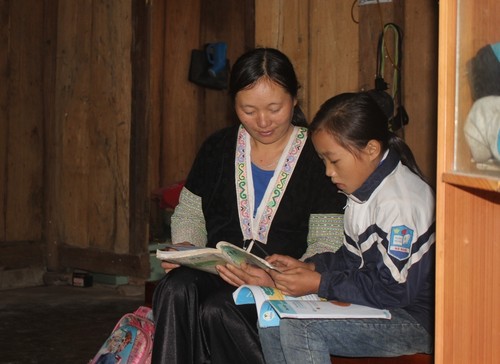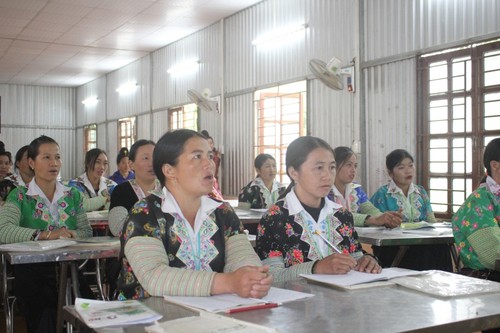 Song Thi Chu and her daughter in Na Nghi commune, Song Ma district (photo: VOV) Song Thi Chu and her daughter in Na Nghi commune, Song Ma district (photo: VOV) |
It’s early in the morning. Song Thi Chu and her daughter in Na Nghi commune, Song Ma district, are busy getting ready to go to school together. Her daughter goes to Na Nghiu primary school and Chu attends a literacy class for adults.
Going to school is a natural thing for most people, but it was only a dream for Chu, a Mong woman, for more than 30 years. When she was little, her family was very poor. There was no school near her hamlet. She did not go to school, but followed her parents to do farm work. Then she got married and became a housewife. Taking care of her family and doing odd jobs to afford their daily needs, Chu forgot that she was illiterate. When literacy classes were set up in the hamlet, she made up her mind to study in the hope of reducing her hardships.
Chu said: “I couldn’t read, write, or do math. It was very difficult to sell farm produce without knowing how to weigh and calculate. I sell chicken. Now I can read and write. I’m very happy. I’ll try to learn more.”
Lo Thi Thoa of Phong Sai hamlet said that studying is more difficult than doing farm work, weaving fabric, or doing embroidery. But she has tried hard and now can write her name.
“When I couldn’t read or write, I had to ask for help in whatever I did. Now that I’m literate, I don't have to rely on anyone. The teacher patiently teaches me until I understand and remember. After studying for 2 weeks, I can write my name and my children’s names,” Thoa said.
 Literacy class for ethnic women in Na Nghiu hamlet (photo: VOV) Literacy class for ethnic women in Na Nghiu hamlet (photo: VOV) |
80 students, from young girls to gray-haired women, study in the same class. Most never studied before. Some were once literate but became illiterate again over the years.
Teacher Lo Thi Phuoc has been teaching a literacy class at Na Nghiu Primary School for three months.
‘My students come from different ethnic groups – Mong, Thai, Sinh Mun, and Khơ Mú. Some of them couldn’t speak Vietnamese. I use their ethnic language to teach them. Most of the students are poor. We give them pens, books, and notebooks. They learn from the beginning as first graders,” said Phuoc.
The literacy class in Na Nghiu is one of 5 classes in Song Ma district this year. From now until 2025, 18 literacy classes will be held in remote, mountainous, and border areas.
Nguyen Cong Vien, head of the district Education and Training Office, said: “Illiteracy eradication is a difficult task. Most of the learners are of working age. We work with political and social organizations to encourage them to attend the class and organize a flexible schedule after working hours. The teachers can speak ethnic languages. They are enthusiastic and dedicated because the learners are different from children of school age.”
The learners in the literacy classes say learning is difficult but joyful because it gives them hope for a better future.